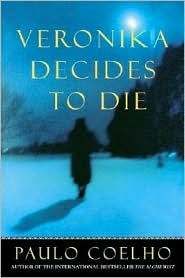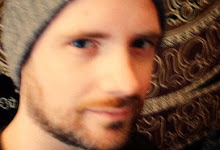
As my friend Patricia says, "Don't get your knickers in a bunch."
This is not a review or recommendation like the great majority of others I've written on this blog: for once, I am not critiquing a "depressing" book (the type -- don't think I haven't noticed -- that has become my choice reading material for the last several months). In fact, the only thing truly depressing about Paulo Coelho's 1998 novel "Veronika Decides to Die" is the title itself. The story it encompasses is actually one of the most -- if not the most -- positive, inspiring, insightful, and life-affirming books I've ever read. So, please, before you're put off by the novel's rather bleak title, hear me out. This book just might change your life.
On a skeletal level, the tale revolves around Veronika, a 24-year-old Slovenian woman, who decides to commit suicide. She is not particularly sad, or clinically depressed, or crazy; on the other hand, she is also not particularly happy, or content, or fulfilled. She's just...well, she's just pretty meh about her life. Everything that comprises her existence has left her feeling empty and inauthentic: her job as a librarian, her popularity with men, her circle of friends and family. She views it all with such an intense disinterest that she can only regard her present life as the result of a series of disastrous choices she's made in the past, and her future life as a plodding, painful, monotonous marching-on of the routines she has established: a long, slow, and not-very-graceful waltz to the grave. When debating the option between spending the rest of her considerable number of days waking in the morning, sitting in a windowless cube for eight hours, going home, having dinner, watching TV, and going to bed -- before doing it all over again and again, ad infinitum -- and the prospect of ending her own life, Veronika chooses death. Making this decision is her way of taking back control, of being heard, and it thus gives her a terrific sense of empowerment -- much to her own surprise: it's been ages since she's felt anything at all.
And so our eponymous heroine one evening takes handfuls of sleeping pills and prepares herself for death, with an excitement bordering on giddiness. This is the end of the entire awful routine, and she herself has chosen it. She closes her eyes and waits for the blessed finish.
When she opens her eyes, she briefly thinks she's entered an afterlife of some sort (an afterlife, incidentally, that she never really believed in). Until she sees the horrible fluorescent light bulb over her head: there is NO way heaven would have fluorescent lighting. That's when she learns the acrid truth of her situation. She has not died, she has just emerged from a coma, and she is "safe" within the walls of Villete, Slovenia's privately-funded, less-than-ethical mental hospital. The doctor then tells her that although she failed at ending her own life in one fell swoop, she has irreparably damaged her heart from the overdose, and there's no chance of recovery. She will be dead within days.
And this is where Veronika's journey begins. So, too, does ours.
Now. I say this is the plot on a "skeletal level" because "Veronika Decides to Die" is so much more than a linear, entertaining story. It is a great, majestic book of ideas: ideas that, if we allow them into our hearts, can not only be a terrific reading experience, but a transformative life experience as well.
As Veronika goes about life in the institution, she inadvertently affects the lives of several of the patients and staff members. In turn, we learn their stories as well, and how this peculiar young woman on the threshold of death has inexplicably inspired them to reevaluate their own lives. It's not the typical warm, fuzzy, feel-good Hollywoodized standard of Dying Lady Touches the Lives of All She Encounters. Not by any means. What Veronika inspires is beyond sentimental, even beyond the reminder that we all have the power to change our own lives. What she inspires is revolution.
Hers is a path of ever-increasing awareness, both of her self and the world. This, of course, leads to some big questions. How is one supposed to be an individual in a world full of people who are all doing the exact same thing day in and day out? Where, and how, does the life and mind of a nontraditional thinker, like an artist, musician, writer, or any other creative, fit into this societal mold of required conformity? Why is it that on one hand we receive continuous messages that we are unique and must embrace our individuality, and on the other that the only path to contentment and fulfillment is a 9-5 job, marriage, and a house in the suburbs? What does it mean to be "crazy"? Is it primarily a state of total biochemical mind-fuck, or is it more the condition of a bunch of people who just want to think for and be true to themselves, regardless of society's expectations and demands? And on the flip side of the coin, what exactly does it mean to be "sane"? Does it insinuate some better, more realistic and healthier hold on life, or is it just a term created for the accepted actions of the status quo? Who in this life is truly crazy? The ones locked in mental institutions the world over? Or the cube-dwellers and clockwatchers, the tract-housing owners and parents of 2.5 children, the SUV drivers and flocks of sheep masquerading as people? This is just a sampling of the inquiries put forth on Veronika's journey, and the riddles, complexities, and philosophies inherent in questions like these are what make her story so unique and powerful.
It's relatively safe to say, I think, without the men in white coming to take me away, that I identified on many levels with Veronika. Yet I also identified with the myriad other characters, or, at the very least, saw in them people from my own life. Though this book is sometimes unsettling in its provocativeness, it is this aspect of identification that makes it so comforting. Just maybe we aren't alone in all of this great nutty chaos called life. Despite the individuality that society simultaneously scorns and supports, we still share a lot of common threads. Perhaps, I thought with hope while reading "Veronika Decides to Die", perhaps I'm not the only one asking questions.
And if we all start to ask questions, the revolution is not far off.
This is the first book I've read by Paulo Coelho. I've come to learn that Coelho's books fall into the categories of either "really loved" or "really hated". Critics seem to really hate them, citing them as no more than touchy-feely, New Age prose from a not-very-skilled novelist. Audiences, however, love them. His trademark work, "The Alchemist", has sold more than 65 million copies and has been translated into 56 languages; in all, his entire canon of work has sold more than 100 million copies in 150 countries in 66 languages. I have already ordered my copy of "The Alchemist" and look forward to reading it; I can't imagine, however, that it could come close to doing for me what "Veronika" has done.
It's interesting, and somewhat eerie, that certain books come into our lives precisely when we need to read them. I've had "Veronika Decides to Die" sitting on my shelf for about eight years. I bought it, thought it looked good, and promptly ignored it. But for some reason, last week I walked straight to the bookshelf and pulled out this book, as if driven by some unseen force. When I started to read it (and, unlike most critics, I found it extremely well-written: crisp, poetic, and deceptively simple), I could not stop. I wanted to eat it whole, devour it in one sitting, but something told me to savor it: that a story like this doesn't come along very often. So I heeded this voice (Was it instinct? Was it my cat? Was it God? Was it Meryl Streep?), and savored the novel in small portions, really taking the time to process and digest the ideas it put forth and finding how they fit into my own life.
This is a time when I really needed this book, and I can't explain how it found me after all these years. I've been through some intense personal obstacles lately (which I'm trying to find a way to blog about in a healthy, constructive way), and I needed to hear Veronika's tale. I needed to be reminded that it's OK -- I mean, really OK -- to say Fuck you and follow your heart. I needed to know that I don't have to sit in a cubicle and answer phones all day, or start a family, or happily agree with everyone I meet and suppress my own opinions and desires, to be a valid and vital member of society. I needed to be told that even though I have made some unconventional choices in my life -- some good, some bad -- and often opted for the alternate route, I am no less, and no more, a human being than anyone else.
And I needed to know that despite it all, I am not alone.



No comments:
Post a Comment